price history graphic
[oc] Price History over the past 30 years from r/dataisbeautiful

Digital Literacy for St. Cloud State University
[oc] Price History over the past 30 years from r/dataisbeautiful

Stanford University’s Computer Science department is holding a unique MOOC called ‘Code in Place.’ This is a free course to learn python. It is a live class environment and not a typical video-based curriculum. from r/programming
https://compedu.stanford.edu/codeinplace/announcement/
+++++++++++++
more on Python in this IMS blog
https://blog.stcloudstate.edu/ims?s=python
A virtual reality (VR) medical training system built by Oxford Medical Simulation (OMS) is now being offered for free during the COVID-19 pandemic to help hospitals and medical schools bring in badly-needed additional staffers to provide patient care.
++++++++++++
more on VR and Nursing in this IMS blog
https://blog.stcloudstate.edu/ims?s=VR+nursing
++++++++++++
more about Educators in VR in this IMS blog
https://blog.stcloudstate.edu/ims?s=educators+in+vr
+++++++++++++++++++
more on Python in this IMS blog
https://blog.stcloudstate.edu/ims?s=python
Link to the list here: https://docs.google.com/document/d/e/2PACX-1vQ4sGwNQ2JEV-DAPIDIuy7UhxUErEP8IovilhSFAPTOZxMpWCxEZwMZeKzF-ad1tt_Ck7WSFivWjaWs/pub
Contact pmiltenoff@stcloudstate.edu if you need more info/support, clarifications. E.g. among the great tools in the list is EdPuzzle (https://edpuzzle.com/). EdPuzzle does very much the same as the Video Quiz in the MinnState MediaSpace (aka Kaltura); we can help you figure out advantages and disadvantages of the tools, their pedagogical application and make final choice.
Per the SCSU OER blog – http://blog.stcloudstate.edu/oer/2020/04/05/free-chemistry-resources/:
+++++++++++++
More on chemistry in this IMS blog
https://blog.stcloudstate.edu/ims?s=chemistry
https://blog.stcloudstate.edu/ims/2020/03/30/1st-day-of-online-learning/
Alan and Rachel lead their meteorology students in AltSpaceVR
https://hybridpedagogy.org/our-bodies-encoded-algorithmic-test-proctoring-in-higher-education/
While in-person test proctoring has been used to combat test-based cheating, this can be difficult to translate to online courses. Ed-tech companies have sought to address this concern by offering to watch students take online tests, in real time, through their webcams.
Some of the more prominent companies offering these services include Proctorio, Respondus, ProctorU, HonorLock, Kryterion Global Testing Solutions, and Examity.
Algorithmic test proctoring’s settings have discriminatory consequences across multiple identities and serious privacy implications.
While racist technology calibrated for white skin isn’t new (everything from photography to soap dispensers do this), we see it deployed through face detection and facial recognition used by algorithmic proctoring systems.
While some test proctoring companies develop their own facial recognition software, most purchase software developed by other companies, but these technologies generally function similarly and have shown a consistent inability to identify people with darker skin or even tell the difference between Chinese people. Facial recognition literally encodes the invisibility of Black people and the racist stereotype that all Asian people look the same.
As Os Keyes has demonstrated, facial recognition has a terrible history with gender. This means that a software asking students to verify their identity is compromising for students who identify as trans, non-binary, or express their gender in ways counter to cis/heteronormativity.
These features and settings create a system of asymmetric surveillance and lack of accountability, things which have always created a risk for abuse and sexual harassment. Technologies like these have a long history of being abused, largely by heterosexual men at the expense of women’s bodies, privacy, and dignity.
Their promotional messaging functions similarly to dog whistle politics which is commonly used in anti-immigration rhetoric. It’s also not a coincidence that these technologies are being used to exclude people not wanted by an institution; biometrics and facial recognition have been connected to anti-immigration policies, supported by both Republican and Democratic administrations, going back to the 1990’s.
Borrowing from Henry A. Giroux, Kevin Seeber describes the pedagogy of punishment and some of its consequences in regards to higher education’s approach to plagiarism in his book chapter “The Failed Pedagogy of Punishment: Moving Discussions of Plagiarism beyond Detection and Discipline.”
my note: I am repeating this for years
Sean Michael Morris and Jesse Stommel’s ongoing critique of Turnitin, a plagiarism detection software, outlines exactly how this logic operates in ed-tech and higher education: 1) don’t trust students, 2) surveil them, 3) ignore the complexity of writing and citation, and 4) monetize the data.
Cheating is not a technological problem, but a social and pedagogical problem.
Our habit of believing that technology will solve pedagogical problems is endemic to narratives produced by the ed-tech community and, as Audrey Watters writes, is tied to the Silicon Valley culture that often funds it. Scholars have been dismantling the narrative of technological solutionism and neutrality for some time now. In her book “Algorithms of Oppression,” Safiya Umoja Noble demonstrates how the algorithms that are responsible for Google Search amplify and “reinforce oppressive social relationships and enact new modes of racial profiling.”
Anna Lauren Hoffmann, who coined the term “data violence” to describe the impact harmful technological systems have on people and how these systems retain the appearance of objectivity despite the disproportionate harm they inflict on marginalized communities.
This system of measuring bodies and behaviors, associating certain bodies and behaviors with desirability and others with inferiority, engages in what Lennard J. Davis calls the Eugenic Gaze.
Higher education is deeply complicit in the eugenics movement. Nazism borrowed many of its ideas about racial purity from the American school of eugenics, and universities were instrumental in supporting eugenics research by publishing copious literature on it, establishing endowed professorships, institutes, and scholarly societies that spearheaded eugenic research and propaganda.
+++++++++++++++++
more on privacy in this IMS blog
https://blog.stcloudstate.edu/ims?s=privacy